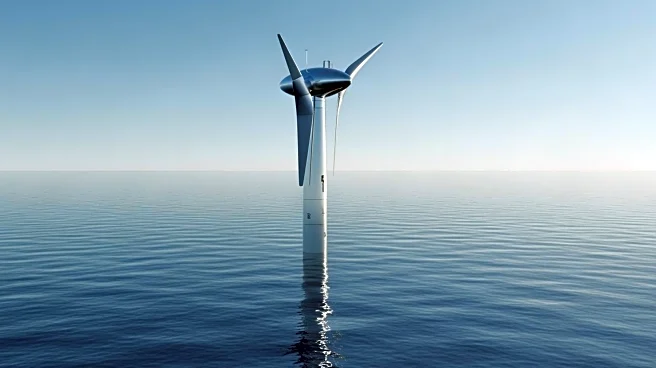What's Happening?
The Marine Energy Council has set ambitious targets to achieve 1GW of tidal energy and 300MW of wave power by 2035, contributing to a global roadmap for marine energy technologies. The Energy Industries
Council (EIC) highlights the potential of wave and tidal sectors to significantly aid in achieving net zero goals. The UK is leading in testing wave and tidal stream projects, with 28 projects in the pipeline. Across Europe, France and Portugal are advancing, but other countries lag behind. Indonesia faces regulatory challenges despite having resources for marine energy projects. North America has resources but lacks urgency for deployment. The tidal sector is closer to commercialization than the wave sector, with the UK poised for world leadership in tidal stream energy.
Why It's Important?
Marine energy offers a consistent and predictable source of renewable power, crucial for energy security and economic growth. Tidal stream energy can support energy capacity and reduce costs, following a similar cost reduction pathway as solar and wind. The report suggests tidal energy could provide cleaner, cheaper energy to coastal communities, reducing reliance on expensive and polluting oil and diesel. Turning tidal-derived electricity into green hydrogen presents opportunities for decarbonizing industries and manufacturing clean fuels. The development of marine energy projects could create jobs and generate revenue for local communities, enhancing energy resilience and supporting the transition to renewable energy.
What's Next?
The report calls for strategic planning to maximize the use of tidal energy resources, focusing on reducing risk for community-scale projects and increasing thresholds for consenting requirements. Collaborative efforts are needed to resolve consenting challenges related to environmental concerns, such as seal collisions. The tidal energy industry is committed to working with regulators and research institutions to strengthen evidence on environmental impacts and develop effective mitigations. The report emphasizes the need for coordinated action across government, industry, and key delivery bodies to support the responsible deployment of tidal stream energy.
Beyond the Headlines
The development of marine energy projects highlights the importance of balancing environmental protection with energy development. The consenting system must evolve to reflect the latest evidence and ensure the scale of tidal stream energy is realized. The report underscores the need for a framework that enables responsible growth, builds trust, and delivers long-term value across communities, the environment, and investors. The collaboration between the tidal energy sector and offshore wind sector presents opportunities for cross-sector innovation and supply chain development.











